#i love me some wittgenstein
Text
German tv shows with lgbt* characters
I think it can be quite hard to find queer german tv shows, so I thought I‘d compile a list with the ones that I have watched so far.
✪ = queerness is centered in this show
A-Z
1899 (2022) (mlm) | Netflix | international
Ángel (Miguel Bernardeau)
Ramiro (José Pimentão)
Krester (Lucas Lynggaard Tønnesen)
All you need (2021-) (mlm) | ZDF | ✪
Vince (Benito Bause)
Robbie (Frédéric Brossier)
Levo (Arash Marandi)
Tom (Mads Hjulmand)
Andreas (Tom Keune)
Barbaren (2020-) (mlm) | Netflix
Marbod (Murathan Muslu)
Flavus (Daniel Donsky)
Beat (2018) (mlm) | Prime Video
Beat (Jannis Niewöhner)
Becoming Charlie (2022-) (trans, mlm, wlw) | ZDF | ✪
Charlie (Lea Drinde)
Ronja (Sira-Anna Faal)
Mirko (Antonije Stankovic)
Blutige Anfänger (2020-) (mlm) | ZDF, YT
Michael Kelting (Werner Daehn)
Dr. Claas Steinebach (Martin Bretschneider)
Bruno Pérez (Martin Peñaloza Cecconi)
Phillip Schneider (Eric Cordes)
Charité (2017-) (wlw, mlm) | Netflix
Schwester Therese (Klara Deutschmann)
Otto Marquardt (Jannik Schümann)
Martin Schelling (Jacob Matschenz)
Dark (2017-2020) (wlw, mlm, trans) | Netflix
Peter Doppler (Stephan Kampwirth)
Bennie Wöller (Anton Rubtsov)
Doris Tiedemann (Tamar Pelzig/Luise Heyer)
Agnes Nielsen (Helena Pieske/Antje Trauer)
Deutschland 83/86/89 (2015-2020) (wlw, mlm) | Prime Video
Alex Edel (Ludwig Trepte)
Prof. Tobias Tischbier (Alexander Beyer)
Lenora Rauch (Maria Schrader)
Rose Seithathi (Florence Kasumba)
Dogs of Berlin (2018) (mlm) | Netflix
Erol Birkan (Fahri Yardim)
Guido Mack (Sebastian Achilles)
Dr. Klein (2014-2019) (mlm) | Netflix
Patrick Keller (Leander Lichti)
Kaan Gül (Karim Günes)
DRUCK (2018-) (wlw, mlm, trans) | YT | ✪
Fatou Jallow (Sira-Anna Faal)
Matteo Florenzi (Michelangelo Fortuzzi)
Zoe Machwitz (Madeleine Wagenitz)
Kieu My Vu (Nhung Hong)
Isi Inci (Eren M. Güvercin)
David Schreibner (Lukas von Horbatschewsky)
Yara Aimsakul (Elena Plyphalin Siepe)
Hans Brecht (Florian Appelius)
Eldorado KaDeWe – Jetzt ist unsere Zeit (2021-) (wlw) | ARD
Heidi Kron (Valerie Stoll)
Fritzi Jandorf (Lia von Blarer)
How to Sell Drugs Online (Fast) (2019-) (wlw) | Netflix
Fritzi (Leonie Wesselow)
Gerda (Luna Baptiste Schaller)
Kitz (2021) (mlm) | Netflix
Kosh Ziervogel (Zoran Pingel)
Hans Gassner (Ben Felipe)
Ku‘damm 56/59/63 (2016-2021) (mlm) | ZDF
Wolfgang von Boost (August Wittgenstein)
Hans Liebknecht (Andreas Pietschmann)
Der Kroatien Krimi/Split Homicide (2016-) (wlw) | ARD
Stascha Novak (Jasmin Gerat)
Loving Her (2021) (wlw) | ZDF | ✪
Hanna (Banafshe Hourmazdi)
Holly (Bineta Hansen)
Franzi (Lena Klenke)
Lara (Emma Drogunova)
Josephine (Karin Hanczewski)
Anouk (Larissa Sirah Herden)
Sarah (Soma Pysall)
Mord mit Aussicht (2018-2022) (wlw) | Netflix
Bärbel Schmied (Meike Droste)
Neumatt (2021-) (mlm) - Switzerland | Netflix
Michi Wyss (Julian Koechlin)
Joel Bachmann (Benito Bause)
Polizeiruf 110 (1971-) (queer/gnc) | ARD
Frankfurt/Świecko
Vincent Ross (Andre Kaczmarczyk)
SOKO Leipzig (2001-) (mlm) | ZDF
Moritz Brenner ( Johannes Hendrik Langer )
Tatort (1970-) (mlm, wlw) | ARD
Berlin
Robert Karow (Mark Waschke)
Hamburg
Julia Grosz (Franziska Weisz)
Saarbrücken
Esther Baumann (Brigitte Urhausen)
Wien
Meret Schande (Christina Scherrer)
Vorstadtweiber (2015-) (mlm) – Austria
Georg Schneider (Jürgen Maurer)
Joachim Schnitzler (Phillip Hochmair)
WIR (2021-) (wlw) | ZDF
Annika Baer (Eva Maria Jost)
Helena Kwiatkowski (Katharina Nesytowa)
Wendland (2023-) (wlw) | ZDF
Kira Engelmann (Paula Kalenberg)
Birthe (?)
Queer Eye Germany (2022) (mlm, nblm, trans) | Netflix
Avi Jakobs
Leni Bolt
Ayan Yuruk
Jan-Henrik Scheper-Stutke
Aljosha Muttardi
Notes: I may have forgotten to add some characters, because for most of the shows it has been some time since I last watched them. Please let me know if you want me to add a character or even show:)
#german#queer#lgbt#TV series#queer representation#lgbt representation#1899 netflix#all you need zdf#barbaren netflix#beat prime video#becoming charlie#blutige anfänger#charite#dark netflix#Deutschland 83#dogs of berlin#dr. klein#druck#eldorado kadewe#how to sell drugs online (fast)#kitz netflix#kudamm 56#deutschland 89#kroatien krimi#loving her zdf#mord mit aussicht#tatort#tatort saarbrücken#tatort berlin#polizeiruf 110
356 notes
·
View notes
Text
I want to shed some light (heh) on the use of streetlight imagery in Rebellion, because it's another recurring visual theme (albeit more subtle than some of the others), starting with Homura's transformation sequence:

It's difficult to convey in a still, and I have no idea if it is intentional, but the angle and the framing always gives me war flashbacks to that one iconic sequence in Revolutionary Girl Utena:
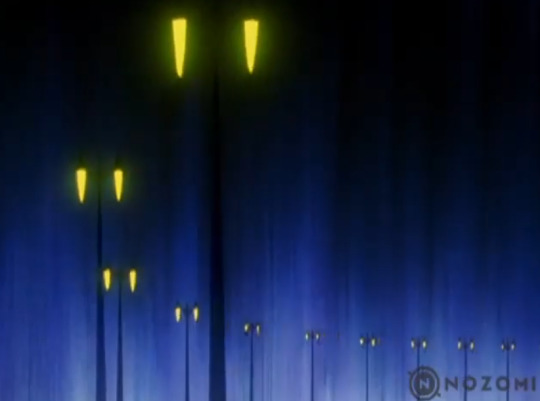
(if you know, you know)
Although the background in the first photo is too blurry to make out, it looks like the lights of Mitakihara City in the background, as if we are viewing this from the park where Madoka and Homura have their heart-to-hearts. However, the lamp designs here are different, specifically lacking the old-fashioned wrought-iron filigree:
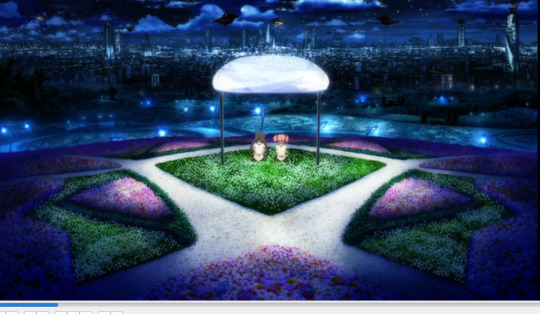
(oh my god, I just noticed the labyrinth in the middle right, this whole garden is just one elaborate metaphor, isn't it, AAAAAAAAAAAA)
Here's a closer look at them--interestingly, they don't seem to have changed much as a result of Homura's takeover.

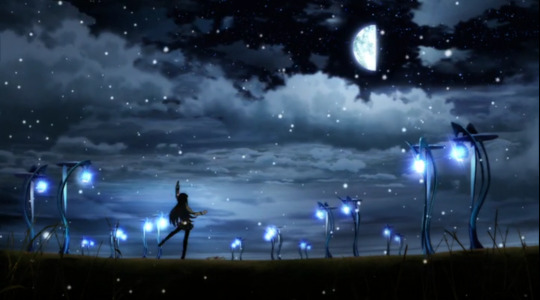
We get a better look at the other lamps later on, illuminating a staircase as Homura monologues about witches. The symbolism here is obvious: Homura is descending into her psyche and these lamps are guiding the way.
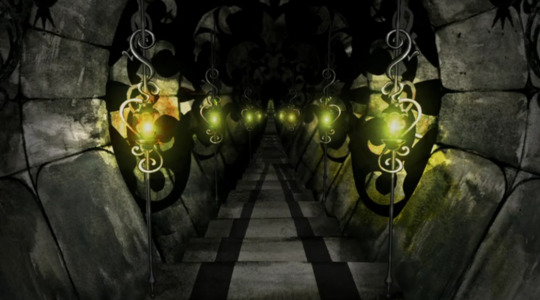
Gosh, that wrought-iron filigree sure looks like a stylized salamander, doesn't it?
The old-fashioned look is well in keeping with Homulilly's general Victorian aesthetic, as well as Homura's apartment building from the TV series, which has an old-world European look to it in contrast to the shiny modernism of the rest of the city's architecture.
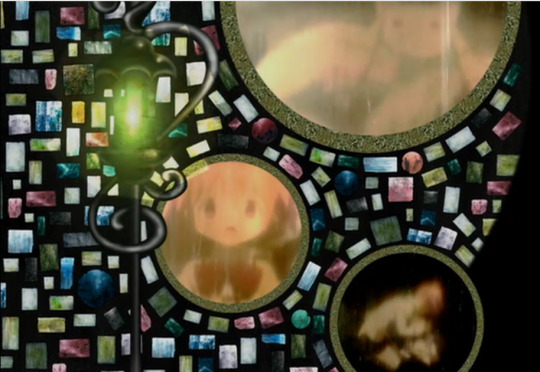
However, when Homura emerges back onto the city streets, the filigree has disappeared. This implies to me that it represents a part of her nature she is not yet consciously aware of, consistent with the other subtle uses of salamander imagery in the first half of the film.

Here, the lights are old-fashioned, but not to the same extent. They fit right in with the dream-like blending of inside and outside in this scene (which Homura does not even appear to notice).
We see the wrought-iron lamps again in the other descent into Homura's psyche in what I call the "Tunnel of Love" sequence. Not only do we get the lamps again, we also get the windows representing salvation/connection to the Law of Cycles/Madoka, scissors, and keys in sealed glass jars.
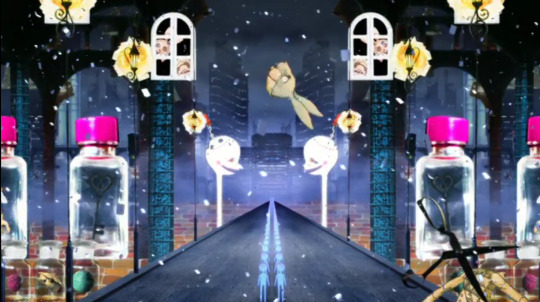
(As an aside, the blob in the middle sure looks a lot like the famous rabbit-duck illusion, which is an optical illusion famously used as an example of different modes of seeing --"seeing that" vs "seeing as"-- by the German philosopher Ludwig Wittgenstein, which is well in keeping with Rebellion's use of psychological imagery and German philosophy.)
As the original series takes pains to remind us, Homura's name is a homonym for "flame", so it makes sense to me that she would unconsciously gravitate towards flame imagery. These old-fashioned lamps are a more benign, focused version of the apocalyptic conflagration that destroys the city later on.

Note how the streetlights now resemble sewing pins--the primary weapon of the Clara Dolls.
Streetlight imagery also appears in the original TV series, although the focus is less on the lamps themselves and more on all the insects attracted to it (an obvious metaphor for magical girls):


It's fascinating how the same object can represent completely different things depending on context even within the same series.
47 notes
·
View notes
Text
Denmark - where the museums are progressive enough to erase woman from their names but the royal couple know who can be exploited for a baby.
A statue of a naked, bearded man attempting to breastfeed an infant is drawing disapproval on social media for what some critics are calling female erasure. The nude figure, constructed in 2021 as a self-portrait by Aske Kreilgaard, is depicted with exposed male genitals and breasts to which he is holding a feeding baby.
Despite having been created to commemorate International Men’s Day, the statue has now been placed outside of The Gender Museum (KØN) in Aarhus, Denmark, which was previously known as the Women’s Museum (Kvindemuseet).
The facility was originally founded in 1982 to educate the public about women’s history, but in 2021 was renamed to reflect a shift in focus towards topics of gender and sexuality.
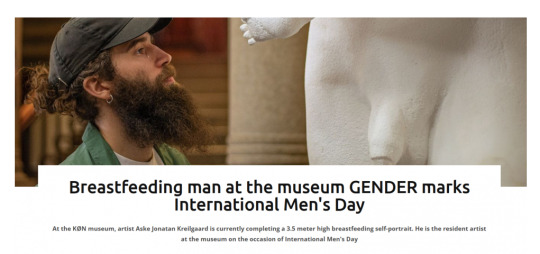
The Gender Museum justified the decision to change its name by claiming that gender roles had “changed significantly,” and that the emphasis of the museum would be focused to shift towards “freer expression” of all genders.
“A lot has happened in the relationship between the sexes since the Women’s Museum Association saw the light of day. Men’s gender roles and function in society have also changed significantly,” the museum’s website stated.
“The cultural heritage rests in places on old divisions between genders and roles, while the present expects freer expression of all genders. Just as women’s research at universities today is called gender research, the museum has followed the same development in its ongoing depiction and documentation of cultural history.”
The former Women’s Museum first began to incorporate elements of gender ideology into their education programs in 2016 and currently offers sex education for children in primary school “through a culture-historical and norm-critical view of sexuality and gender.”
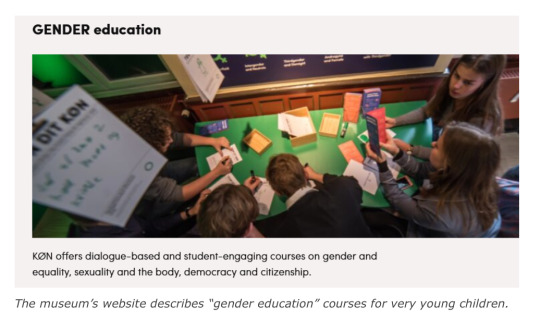
“The societal norms that [children] experience on their own bodies are set against cultural history through objects from the history of sexual culture. In this way, we show the students that sex, gender roles and understandings of sexuality are rooted in our cultural history, and that ideas about gender, sexuality and sexual practices have changed over time,” reads the description of the course on the museum’s website.

The sculpture’s creator, Kreilgaard, has said in an interview with Fine Spinde that he titled the work Agape, a Greek word meaning “love.”
Just after the statue was erected, sculptor, photographer and writer Suste Bonnén sharply condemned the museum’s decision to commission and feature the piece in an article published by Kristeligt Dagblad titled, “Statue of breastfeeding man is a pedophile’s dream.”
“Isn’t Agape a pedophile’s dream? A grown naked man who enjoys putting a small child up to his nipple for him to suck is to me the epitome of what pedophiles dream of,” Bonnén writes. She further elaborates on how the area is an erogenous zone for both women and men, but highlights that whereas “the mother satisfies the child’s needs,” a man, being incapable of nursing, “only satisfies his own.”
Bonnén went on to describe the statue as flouting exploitation.
“I don’t see that the gender roles are being played with, as many others do. I see an exploitation of the little child, and a man playing with his own gratification. That is why I find it disturbing that both genders and audiences today welcome the message: The grown man can do whatever he wants with a small child, as long as we call it Agape.”
While the statue was erected outside of the museum in November of 2021, photos of it just began circulating in social media this week and prompting backlash. On Facebook, some Danish feminists noted that they had attempted to protest the name change of the museum in 2021, but found their concerns being ignored as museum officials reportedly felt shifting away from “women” and towards “gender inclusivity” was a better financial decision.
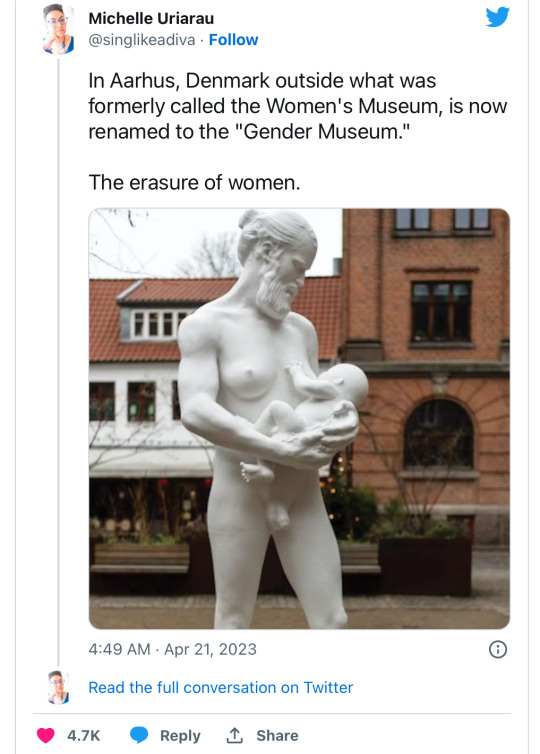
The photo of the statue that first prompted discussion on Twitter was posted by Michelle Uriarau of Mana Wāhine Kōrero, a Māori women’s group. Uriarau also referenced the name change at the museum, calling it “the erasure of women.”
Over one thousand people replied to Uriarau’s post, some of whom were expressing disbelief that the statue was even real. Many Twitter users were outraged at the symbolism, and the fact the statue was now housed outside of a former museum dedicated to women.
“The parading and exhibiting of the male sexual fetishist. Only women give birth and only women breastfeed NOT men,” user Elise Willows wrote beneath the photo.
“A nursing baby as the ultimate fetish accessory. Disgusting,” another tweeted.
Others in the replies referenced recent attempts to “neutralize” the language around motherhood and breastfeeding, something that has been shown to have a negative impact on maternal health outcomes. Some also referenced incidents involving trans-identified males attempting to breastfeed babies.
Last year, Reduxx reported on a Reddit post featuring photos of a trans-identified male user breastfeeding his wife’s newborn baby.
The post, titled “Oh my God I’m breastfeeding my daughter,” detailed how the user worked with a lactation consultant and his gender physician for several months prior to his female partner giving birth. Immediately following the baby’s birth, the user said he had begun breastfeeding the child to supplement formula feedings. The user also included a link to a photo gallery showing snapshots of himself “breastfeeding” the baby.
In 2018, an endocrinologist from Boston Medical Center claimed that breast feeding was an important method of validating a trans-identified male’s gender identity.
In an interview with The New Scientist, Dr. Joshua Safer said: “Many transgender women are looking to have as many of the experiences of non-transgender women as they can, so I can see this will be extremely popular.”
Reports of trans-identified males seeking support from lactation consultants have increased. On social media, many new and breastfeeding mothers have also stated they’ve noticed an increase in men attending breastfeeding groups.
According to the Danish Agency for Culture and Palaces, of about 2,500 monuments nationwide, only 28 commemorate women. The nation’s lack of female-focused memorials was the subject of a 2022 sculpture project that highlighted the lack of visibility of women in public art.
Reduxx contacted the Gender Museum for comment, but did not received a response at the time of publication.
By Genevieve Gluck
Genevieve is the Co-Founder of Reduxx, and the outlet's Chief Investigative Journalist with a focused interest in pornography, sexual predators, and fetish subcultures. She is the creator of the podcast Women's Voices, which features news commentary and interviews regarding women's rights.
Prince Gustav of Sayn-Wittgenstein-Berleburg and his wife, Princess Carina, are expecting a baby. However, the princess lacks the usual baby bump. Instead, another woman is carrying her child.
Both the prince, who is a nephew of the Danish queen Margarethe and his wife are 54 years old. They had to wait almost 20 years before they could get married due to an inheritance rule from Gustav's grandfather Prince Gustav Albrecht, who was a Nazi, Daily Mail writes. Now, they are becoming parents in their fifties with the help of a surrogate mother.
Royal fans have already claimed that the baby is a boy and is due to be born in May. Official sources have not confirmed the announcement yet. According to a press release from Berleburg Castle, the residence of the royal couple in Germany, the baby is due in the summer. The prince and princess state their thanks in the same press release "to everyone who has helped to find a legal path to follow."
According to Kristeligt Dagblad, the baby will be the first royal child born via surrogacy. It is unknown whether the couple has paid the surrogate mother for her service (commercial surrogacy) or whether they found someone who offered to carry the baby altruistically, the Danish newspaper reports.
Debate
The royal surrogacy baby may renew the discussion about surrogacy in Denmark. Currently, it is legal to have a child via a surrogate mother, but there are quite a few requirements that have to be fulfilled. It is, for example, illegal to get help with insemination, and third parties may not communicate with the surrogate mother.
Leif Vestergaard Pedersen, chairman of the Danish Ethics Council, finds the rules too restrictive. Last January, the council proposed to make surrogacy a standard fertility treatment, Kristeligt Dagblad reports. At the same time, Vestergaard Pedersen warns against commercial surrogacy "because it can in many ways be equated with trade in children."
Age limit
Another concern about the royal baby is the age of its parents. Being 54 years old is a relatively high age for first-time parents, Kristeligt Dagblad states. However, Vestergaard Pedersen thinks this is not something the Ethical Council is concerned with. "There is an age limit in fertility treatment, probably primarily for the sake of the woman giving birth. Regarding more general considerations, parents' age is a consideration. Still, it is not something we have discussed or have immediate plans for", he says.
Fertility doctor Malene Tanderup Sørensen points out that there is no biological age barrier regarding surrogate parenthood. "However, the fact that they are older is one of the things that can help put the debate on surrogacy at the forefront."
Happiness
In any case, the royal family welcomes the baby with happiness. Lene Balleby, a spokesperson for the family, says that the royals "are very happy on behalf of the couple."
Historian and royal house commentator Lars Hovbakke Sørensenpoints out that the royal house is usually more conservative than the general population. However, he thinks the difficulties the royal couple overcame to get married "can help to create more understanding around their decision about surrogate motherhood."
They could have gotten married earlier but he would have lost his inheritance due to the will his Nazi grandfather left.
#Denmark#men can’t breastfeed#the Women’s Museum (Kvindemuseet) is now the Gender Museum (KØN)#Gender inclusivity was a better financial decision#Only 28 of 2500 of Danish monuments commemorate women#Prince Gustav of Sayn-Wittgenstein-Berleburg#Princess Carina#no one is entitled to children#Both parents will be 75 when the kid turns 21#Exploiting women
105 notes
·
View notes
Note
It’s clear as day to me that CE is a love bomber and all of those trips beginning of 2022 with her prove it. I think they hooked up and he caught feelings - which wouldn’t be hard to impress him, hell just do yoga and have existentialism talks and say you wanna live a quite life, BAM! He’s hooked. I think he dove in head first and thought he found a way to finally get his family and it’s just been going on from that. But reality sets in eventually and only time will tell. He is so immature.
Look, know what pisses me off? (Because I'm really not wanting to talk about her at all, but this has so been sitting on my chest.)
That the little bit of "research" she did for Mrs. Harris Goes to Paris for her character in the form of reading a little Sartre and some other mid-century philosophy and literature so gave her another little veneer that fit right in with what titillates him. Like, come on!

So then she posts it up a little in her IG and talks about it a little in interviews and it's like a fucking mating call for Mr Wannabe Deep Guy. And it's just another footnote in how easily played he looks.
Look, obviously, I'm coming from my own viewpoint that assumes he is the total dumb dick decision man he looks like. But it's just like - COME ON! He says what makes Boston sexy are all the universities and educated people, and yet he falls for the most facile of mentions of anything "intellectual." Like, love yourself more, bro. At least with Jenny there was an Ivy League diploma there. Instead, now he's just okay with vapid bullshit wannabe influencer level platitudes.
Like, W-H-Y am I even still here for this unrepentant pathetic frat bro? I put in the fucking time of reading the Sartre, and Kierkegaard, and Wittgenstein etc. ad nauseam. This is now just some kind of long-ass troll of all of us who value learning, and that's pissing me off on a whole other level - a deeply, intrinsically personal level which borders on what is spiritual for me. You're fucking with my personal religion now, Pantene and Buckethead.

Thank you for coming to my pissed off TED Talk rant! I'm hangry and need to go buy food.
94 notes
·
View notes
Text
Psyche in the World
In analysis sometimes there comes a precious moment when the analysand feels the power of a strong insight newly received and thanks the analyst most profusely for the gift. When this occurs in my practice I say to the analysand, “Please remember that what happens in this room is not nearly so important as what happens when you walk out of here. That is what really counts.” All the self-examination that we do is valuable only as an introduction to our real selves as we live in the world. I firmly believe that none of us can be, or should be, so self-involved that the external world pales in importance in comparison with the inner world.
Yet depth psychology, which includes Jungian analysis, psychoanalysis and all their derivations, has been criticized as being solipsistic—and not without reason. Solipsism is nicely defined by Louis A. Sass in his book The Paradoxes of Delusion as “the doctrine in which the whole of reality, including the external world and other persons, is but a representation appearing to a single, individual self.” Sass quotes Wittgenstein as saying that solipsism is an example of a philosophical disease born not of ignorance or carelessness but of abstraction, self-consciousness and disengagement from practical and social activity. This is a serious charge. For most people, most of the time, this is a distinctly undesirable habit of thought. But for others the kind of isolation that provokes this description may be as necessary for the psyche in deep distress as is an intensive care unit for a physical body in a life-threatening situation. During my own analytical training I lived in Zurich for four years without holding a job or having any other major responsibilities. I was intensely focused on my own analysis and on courses at the Jung Institute that only encouraged in[1]tense introversion. For me it was necessary to “disengage from practical and social activity” because at that time these had acquired such a negative tone for me and had been so firmly established in my own mind that there was little hope for a compromise between analysis and a “normal life.” It was necessary for me to establish entirely different patterns of habit and direction if I was to undergo the inner transformation that would free me to live a more balanced and productive life.
I happened to be among the few fortunate people who could afford the luxury of taking a psychological “vacation” from the everyday world for a time and enter into unexplored realms of the psyche’s activity. This luxury was bought at the price of selling my home and other assets to raise the necessary funds for an extended stay in Zurich. I believe that I was temperamentally suited for this particular path, having been deeply interested in the twists and turns of the psyche’s labyrinthine ways since my early teens, but this extremely inward path is not something I would recommend for everyone. It is very strong medicine. In my own practice I usually encourage analysands to try to keep a balance between their inner processes and their lives in the world. I have come to be acutely aware that it is necessary for a person to have a relationship with the world that is compatible with the relationship between the different aspects of the individual psyche. I cannot forget the words of I Corinthians 13:2: “And though I have the gift of prophecy, and understand all mysteries, and all knowledge... and have not love—I am nothing.”
There is some valid basis for the criticism that has been leveled against the isolation and self-absorption that intensive psychotherapy sometimes fosters. James Hillman, a Jungian analyst who has given up, or retired from, the practice of Jungian analysis, puts it succinctly in the title of his book, We've Had a Hundred Years of Psychotherapy and the World's Getting Worse. While I can appreciate his frustration, I must counter with the remark that this is not necessarily indicative of a cause-and-effect relationship; after all, we’ve had more than a hundred years of Western medicine, and the mortality rate in our population is still one hundred percent. And I am not so sure, in response to Hillman, that the world is getting worse. After all, the human race has come to its present condition as a result of its behavior over many thousands of years, and one hundred years is scarcely enough to cure its ills.
Psychotherapy, despite the relatively short period it has been on the scene and despite its limitations, has played an important role in some remarkable changes in human behavior, and its potential for the next century is most promising. However, before this promise can be fulfilled, the means for delivering psychotherapy will have to be adapted to meet the social, economic and political realities of the next decades.
The first century of depth psychology, of Jung, Freud and their followers, was a time in which it was seen as necessary for purposes of psychological health to disengage from the collective. Depth psychology was developing much as an individual person develops during the first half of life. Then the ego, or sense of identity, is just taking form and has to find its stance independent of what surrounds it. So depth psychology has had to make its way, to become known, and to earn respect as a special way of working with the psyche. Perhaps the next century will see a change similar to that which typically occurs during the second half of an individual’s life when the person's values have become broader, when it is not enough for a person to do what is necessary for the individual but which takes into consideration the context in which the individual lives. It is not only the analytic way that must survive then, but what we have learned from analysis can be seen as a source of strength, insight and wisdom that can be injected into society to do its work. In the process analysis may even lose its own identity as a form of psychotherapy, but if the principles it embodies can continue to grow, develop and be fruitful, there is no real loss.
It is not only individuals who are today depressed, unfulfilled, or living without purpose or direction; much of this mood is abroad in the world. Unless consciousness changes, the world cannot change. For the most part, the uses of depth psychotherapy have been limited to a small proportion of the population, people with the economic means, the time, the temperament and the inclination to commit to a long-term project which temporarily may have an emotionally unsettling effect on them. For those who have undergone the process and stayed with it until some salutary results have been achieved, it has had a seminal effect. Most of these individuals have become empowered to live in the world in a different way than before—with greater insight, understanding and compassion for others, and with a perspective on life that goes beyond the satisfaction of their individual needs and desires. By and large, they are people who make valuable contributions to society. Their times of introspection and inner work have helped and continue to help make it possible for them to participate more fully, not less, in the affairs of the world. Change must begin with the individual, but can we any longer afford to heal the ills of the world person by person?
The individuation process, as Jung described it, was the product of a particular time in the history of the analytic process. Jung first defined individuation in 1913, in the initial version of his book on psychological types. He described individuation as “a person’s becoming himself, whole, indivisible and distinct from other people or from collective psychology (although also in relation to these).”! Jung emphasized the attributes of the process as follows: “(1) the goal of the process is the development of the personality; (2) it presupposes and includes collective relationships, i.e., it does not occur in a state of isolation; (3) individuation involves a degree of opposition to social norms which have no absolute validity: The more a man’s life is shaped by the collective norm, the greater is his individual immorality.”
This third point is just the issue with the world that analytical psychology must face today. Jung distrusted “the collective.” He regarded collective norms and collective morality as contrary to the interests of the soul or psyche and believed that it was necessary in the process of psychological development for the individual to stand against “the collective.” Writing just before the onset of World War I, with Switzerland as a neutral country keeping silent while preparations were being made on all sides for the imminent conflict, one could imagine his predicament. In those times, and for many years thereafter, most people—unless they were highly placed in official circles or else working people who were primarily concerned with the burdens of keeping bread on the table and caring for their families—were members of the collective, and were, as we would say today, “politically correct.” They spoke in terms that were agreeable to the ruling classes, and they did not try to overthrow governments. So to advocate standing against the collective was to require a show of courage and conviction. One would have to be singularly devoted to one’s own path to go against the conventional view.
During Jung’s lifetime, analytical psychology was highly suspicious of all kinds of groups. The idea that groups of people reduced everyone down to the lowest common denominator prevailed in Jungian circles. Instead of submitting to the collective, psychological work was to be done in the privileged container of the consulting room between therapist and patient in strict confidentiality. There was no place in Jung’s psychology for marital counseling, family counseling or group therapy. It was not until the 1970s that there could even be a discussion of working on dreams in a group at the Jung Institute in Zurich. This attitude has changed over the years in response to the changing spirit of the times. I know, because I was the first Jungian analyst to give a course on working with dreams in groups there. When I proposed the course a decade or more after Jung’s death, there was a heated debate in the Curatorium (the governing body) as to whether this should be permitted. The “experiment” was tried, with some reluctance on the part of the faculty, but met with an enthusiastic response from the students.
Over the past several decades people have become increasingly liberated from the dictates of the collective. To begin with, the collective no longer exists in the sense of the word as Jung used it. Most countries in the Western world today, and the United States perhaps more than others, have undergone population explosions due as much to immigration as to an increase in births. The result has been a burgeoning diversity in the population with respect to ethnicity, religion, race, sexual orientation, education and socioeconomic status. In the sixties, when we used to speak of “the counterculture,” the image of radical young people who used psychedelics, lived in communes and never trusted anyone over thirty was conjured up. Today we can hardly speak of a counterculture, for our culture is so fragmented now that the majority of the people belong to the “minorities.” And even among the so-called majority there are many political factions, each with enough power to challenge other political factions. The point of this is that there no longer exists anything like what Jung thought of as the collective. Consequently, there no longer exists a counterculture. We are all here together, we members of the motley crew of this spaceship Earth.
A major task of government, including that of the United States, in this last decade of the century seems to be to provide certain umbrella protections and services for its people. This sort of government is subject to and influenced by so many different interest groups, with all the checks and balances that implies, that it cannot be monolithic. Government today is and must be flexible and responsive to its people.
One imperative in the cultivation of this wide area is in the field of health care. The United States is the latest among the developed countries of the Western world to introduce a system which would guarantee basic health care to all its citizens. Mental health care must surely be included as a part of this program. This brings up the question, how is “mental health care” to be defined? Workers in the mental health field know that, in a program designed to provide universal health coverage, choices will have to be made as to who receives care and what kind. Surely the most seriously disturbed patients, people who would endanger themselves or others, will be the first to be included in the plan, followed by those who absolutely cannot manage to live outside of a protected environment. Next will come those whose functioning is sufficiently impaired to make it difficult for them to work or to attend school or to live with others or independently. Mental illness based on organicity and the treatment of addictions will surely be included. Treatment of the criminally insane must be a part of the package of covered services.
Near the end of the list will be short-term outpatient psychotherapy. This suggests that treatment will be available mostly to solve immediate problems or crisis situations. All mental health services will be “managed,” that is, they will be subject to the approval of officials who have never seen the patient and whose decisions are largely based on protocols and economic considerations. Under such a program many people will receive affordable care that would not otherwise be available to them. But there will remain many people whose needs do not fall within the scope of the basic health care that is proposed or provided.
Long-term depth psychotherapy or analysis for people who are not seriously disturbed or dysfunctional may very well be considered to be outside the limits of the health care system. Analytic work does not focus primarily on immediate problems, but seeks to use the presenting symptoms as keys to understanding whole persons in the fullness of their beings. It does not simply try to remove or cover up the symptoms, but rather to discover their meaning and their message. The analytic process does not attempt to restore the individual to the former state that existed before the circumstance or condition that brought about the request for therapy. Rather, it seeks a more radical re-formation of the personality by integrating the different aspects of the psyche into a more harmonious whole. Body, mind and spirit are the realm of the analytic process. As with the remodeling of a building, it is usually necessary to go through a “demolition” phase before progress can be seen. In depth psychotherapy things may appear to get worse before they get better. The goal is not merely a restoration to “health,” but a sense of wellness that surpasses anything that existed in this individual before. This comes about as the result of what Jung called a new Weltanschauung or “world view,” which develops in the course of the analytic process.
The question must surely arise as to whether this kind of long-term depth psychotherapy, including analysis, can be considered “basic health care.” How does a health care system define those of us who give this kind of care? How do we define ourselves? At this writing, it is not yet clear what the health care system will cover finally in the area of mental health but the likelihood is that other types of treatment will be given priority over depth psychology for some time to come. The practice of Jung’s psychology may have to redefine itself if it is to survive in this climate.
Jung's psychology, and all psychology that seeks to probe the depth and meaning of human experience, make a contribution not only to the well-being of individuals, but to how they view the world and how they will influence it. There will always be those who seek the level of understanding toward which depth psychology strives. It has been said that this kind of work is elitist, available only to those who have the financial and educational resources to be able to enter fully into it. This is only partly true. Many people have sacrificed time and money and other activities they valued, to be able to do analytic work even if they did not have health care coverage for this. Yet many who have not been able to do this have an inner commitment to follow the path that leads toward greater consciousness in whatever way is possible for them.
I remember hearing my colleague Clarissa Pinkola Estés, author of Women Who Run With the Wolves, saying that she is a confirmed storyteller who supports her habit by doing Jungian analysis for a living. Perhaps some of us Jungian analysts will have to turn the tables and support our habit of practicing analysis with doing some other types of psychotherapy for a living. We can add many therapeutic skills to our repertoire that will serve purposes similar to the classical analysis, but will be more accessible to more people. I have discovered a few ways to do this over the years, and I would not be surprised to learn that many of my colleagues have done similar kinds of work, using the insights they have gleaned from ana[1]lytic practice and applying them in other contexts. Often the adage “Necessity is the mother of invention” proves its worth.
My first opportunity to utilize this principle came about when I returned to Chicago from Zurich after finishing my analytic training. Since it would take time to build an analytic practice in a community where there had been no Jungian analyst before, it was necessary for me to take a paying job. The only position I could find that even remotely matched my qualifications was in a school for emotionally disturbed preschool children. To be honest, the job description called for a social worker, but I persuaded the director to change the title to psychologist. I imagined I would be doing in-depth work individually with the parents but this proved to be far from the case. I was told in no uncertain terms that this was a “family agency, and I would be obliged to work with the entire family, although I might later see one or another member of the family individually if that seemed appropriate. Having been trained to help the individual differentiate from the matrix of home and family and find his or her unique path, it went against everything I knew to see people in the context in which they lived. I expected people to come to my office, one at a time, and engage in dialogue with me. Can you imagine my feeling when I was told that I had to make a home visit on each case, spending time with the whole family, observing their interactions? Remember, this occurred in 1965, when family therapy was very new and few people had even heard of it. Because it was for me a matter of survival, I made that first home visit. What happened totally amazed me! Even if I had not spoken a word, to see before me the home with its decor that expressed the taste and interests of those who lived in it, the way the children’s toys were scattered about, showing how strict or permissive the household was, the way the parents spoke to their children and vice versa, the relationship between the husband and the wife, the effort to make a good impression upon me or the lack of it, the ability on the part of everyone to deal with the unexpected—all this was sending messages to me that I never in a thousand years would have perceived from the analyst’s chair in my office. I began to see that there were other ways. And still, with this first family, I discovered in the father a deep desire to understand his own nature, that included and went beyond his interest in developing a more harmonious relationship within the family. So, when I did have occasion later to work individually with the father, our interaction had more of the character of an ana[1]lytic session. This did not interfere with my work with the mother or with the identified patient, who was the child in the school. I also learned there to do child therapy using small dolls and other figures to help children dramatize their own experiences with significant others in their lives. One result of this was that I later studied family therapy and learned how to use its methods to enhance the understanding I had of the structure of the psyche. Today, I have more choices as to how I will work with a person or family than I would have had otherwise.
Over the years my therapeutic tools have grown more numerous and varied as I have taught and given workshops in humanistic and transpersonal psychology using many approaches and techniques applicable to individuals and groups. I have found that certain principles learned from Jung’s psychology are applicable to other methods of psychological work. I will mention just a few of these. The first principle is the importance of insight into the projection mechanism, whereby we project aspects of our own unconscious qualities onto others and behave as if the others who receive the projection are really what we imagine them to be. Analysis gives us the tools to recognize those projected aspects of ourselves and to reclaim them. This is particularly helpful, for example, for people who see themselves as being driven by someone to do something. This makes them feel helpless. In reality they drive themselves, but don’t see it until they recognize that the slave driver is not outside so much as within, where it is subject to being transformed. Another principle has to do with taking personal responsibility—not for everything that happens to us, surely, but for the way we respond to events and circumstances. A third principle is the necessity of becoming aware of how we may be facilitating another person’s negative behavior without realizing it. This is a principle that has been emphasized in the vast literature on co-dependence. The corollary to this, of course, is, how can we use consciousness to facilitate another person's positive behavior?
Still another principle has to do with avoiding the “victim” or scapegoat role. One thing I learned to accept early in my analysis is that the person who gets abused is the one who allows herself to be abused. This may seem like an overstatement, but it is probably true more often than not. And the last principle that I will note here, although there are many others that could be included, is the importance of ceasing to be re[1]active to external situations and to take instead a pro-active role in which the authentic person that you are is taking charge of your actions.
Let me cite an example of how some of these principles can be taken into the world and utilized outside of the analytic setting. Janet, an analysand of mine, had gone through certain experiences in her childhood and early adolescence that led her to feel victimized. These had been a source of ongoing pain for her. Being pro-active, she decided to do some research on how other women, similarly abused, had managed to recover sufficiently to lead successful and productive lives despite their early traumatic experiences. She assembled a small group of women and met weekly with them in a setting where they could tell their stories and share with one another their experiences of coping with their distress. In the course of these meetings the women developed a practical program for overcoming the “victim mentality.” Janet then went on to teach the tested methods to other women.
Our society is replete with opportunities for the insights gained from depth psychology to be applied to social problems. The challenge to depth psychology is to find more ways to widen the area of its influence so that it permeates not only the field of health care, but also education, family life, the workplace, the economy, foreign policy and the ecology of nations. All these areas have a stake in achieving productive change, inasmuch as all are interrelated and interdependent parts of a whole. This is a large order. Long-term goals are easy to put aside when there are so many urgent needs crying for attention. To be sure, society needs people to put out the fires, but it also needs people to scan the entire terrain and see where the trouble spots are and how each one is related to or dependent upon another. The question that properly comes up next is, where do we find the resources to bring about the hoped-for change in consciousness? Who are the people who can help?
Let me suggest that we do not first call upon the people who have been the driving forces in the contemporary culture. We have already heard the voices of the arbiters of cultural consciousness. What we have heard far less are the voices of what we could call the cultural unconscious—or the less vocal parts of society. These people watch and listen, they observe and reflect. They know far more than most people give them credit for. It is time to ask them what they see, what they need and what they can contribute. We might begin by asking the ordinary person who is just struggling to get along in the world.
Immediately after the earthquake that rocked Los Angeles in January 1994, well-meaning social agencies prepared large buildings, schools, armories and the like to house the people who had been left homeless when the quake suddenly destroyed their homes at four thirty-one one Monday morning. Most of these people refused to go into the strong buildings, but insisted on sleeping out in the open. They were afraid that the buildings would collapse on them, and no amount of reasoning could reassure them otherwise. The relief workers listened to the people who knew what they needed, and set up canvas tents where they could feel safe in the open air with the ground underneath them and only a canvas shell between themselves and the sky. We learned from them that it is not useful to ignore the sensitivities of people.
Another resource is the elders of the community. Most younger people do not realize that elders, those who have cultivated their inner lives, are different from younger people in that they have less invested in their personal concerns. Having experienced losses of every kind in their lives, they realize that personally they have not much more left to lose and that the little that they have will also be gone before too long. They are interested not in sowing for a future harvest for themselves, but in making the most of what remains to them in time, in energy, in wisdom. They have seen eras of good fortune and eras of ill fortune come and go, and they know that everything changes, so they are not easily upset by the events of the moment. They may sometimes counsel just to wait, it will be different soon. They have watched history unfold, and they can foretell with uncanny sureness when the lesson we have not learned from history will present itself again in a slightly different form. The elders who have continued to enjoy a lively interest in the world around them have much to teach younger people.
Another resource: indigenous peoples. Almost everywhere in the days before colonial powers set forth into so-called primitive lands, including the land that has come to be the United States, people accepted life and death and the sometime violence of nature as quite natural. They did not attempt to exert control over nature. They lived as an integral part of their environment, drawing what they needed from it and no more, without trying to store up life's bounty for the future. Lands were not privately owned. The indigenous people did not exploit or deplete the land, but developed a reciprocal relationship with the environment. They taught their children what they needed to know to live in their world. They perceived the world as a spiritual existence embodied in the garments of nature—every tree and stone contained a spirit that was akin to the divine spirit. And so, guided by the spirit within, which we might call the voice of the unconscious, they trusted the ways of the world and shared its bounty with one another. Their respect has been for their ancestors and their concern is for the generations that will follow them. We can learn from these people, not by imitating their superficial representations, but by allowing them to be heard and listening closely to them while they tell us what they know.
Another resource is the immigrants who have recently arrived. Americans tend to forget that we are, by and large, the children and grandchildren of immigrants—the people who built this country with their own sweat and aspiration. A small boy in school was told by his teacher, “Now we are going to study native Americans.” “Native Americans?” he cried out with some indignation. “Aren't I a native American? I was born here!” Yes, almost all natives of our land are the sons and daughters of those who came here as strangers. And others continue to come to our shores. It is the great variety of languages and customs and information that the strangers have brought that has grown into the eclectic mix of people we call Americans. Each ancestral tradition has taught its children something which they have carried to their new homeland. These are treasures and should be so regarded. Their very multiplicity underscores the psychological reality that we can and must retain our unique characteristics while blending harmoniously with the whole society.
Then there are the wisdom teachers, for example, the Tibetan masters. Forced out of their own country where they were isolated from the rest of the world, they fled, carrying with them the knowledge of things mysterious that are un[1]known here. Had it not been for their uprooting and their exile, we would not have access to their traditions concerning life and death, birth and rebirth. They give freely of their wisdom to those who will listen. There is much to be learned from these people, but even a little can be surprisingly enriching. The Dalai Lama once said, “My religion is very simple. Kindness.” What a profound teaching!
The gay and lesbian community is another resource from which we can learn. I have asked myself, why is it that there are so many creative people in the arts among these men and women, far disproportionate to their numbers? My speculation has suggested at least two possible reasons. These are people who have distanced themselves from the straight and unyielding mores of a more conservative society, with all its sexual constraints and fears, to experience the reality of their own natures. In order to do this, they have had to defy convention. Their willingness to stand against the prejudices of people with closed minds was then extended beyond the realm of sexual preferences to preferences in the arts and in other areas where individuality was valued above conformity. Another contributing factor may be that many gay and lesbian people do not have families to support, and consequently they may have more freedom to pursue the careers and avocations of their choice. They can teach us much about creativity and its costs. Politically, these people have called our attention to the important principle of equal rights for all, something everyone professes to believe in but tends to forget from time to time. They can also teach us much about love and loss and pain, and how members of a community can support one another in the most difficult of times.
We might listen, too, to the many families who are deserting the cities with all their pressures and choosing life in small towns or rural settings. These are people who want to live in more natural surroundings. What are they seeking that life in our high-powered cities no longer offers them? What are they learning and what can they teach the rest of us?
Big businesses that want to improve their functioning are listening more and more to people in the rank and file of their organizations. It is the people whose hands are on the machinery who understand what is going on, what needs to be done to improve things, and how to go about making changes. “Management by walking around” is a good principle, because how can you know what to do unless you know what is being done? The efficiency of the hierarchical structures that characterized business organizations in the past is being seriously questioned now. Businesses are asking, how can we make the most of our human resources? Consultants with an understanding of depth psychology are being called in to “diagnose” the ills of the business and to help in developing “treatment plans.”
There is one more frontier I want to mention in which the insights of psychology have been moving out of the consulting room and into the world. This is the area of illness and health. It is generally accepted today that almost all physical or organic diseases have psychological components. Physical and psychological problems are not separate entities, but are closely interrelated, for our emotional state affects the body and vice versa. Each person is a complex of body, mind and spirit (though the third aspect is not yet so widely recognized as a universal aspect of the human condition). The psyche, which is composed of mind and spirit, exerts a profound influence on the course of physical illness. We can will ourselves to die or we can surprise our doctors by the degree to which our own psychological practices can bring about “spontaneous” self-healing. This potential has been well known for many centuries by those engaged in healing professions. It has only been since the so-called scientific revolution—which began after the schism between faith and reason brought about by the seventeenth-century Enlightenment—that medical science turned away from the less rational means of healing and sought cures based on scientific methods of research and treatment. This development resulted in tremendous advances in knowledge about the body and in the technology and techniques of medical treatment. However, for quite some time, modern medicine’s obsession with the treatment of the disease left little time or energy for attention to the treatment of the patient. The patient, too often, was “the appendicitis in Room 304.” Meanwhile, the care of the person—by which I mean the suffering human soul—was left to those who ministered specifically to the individual’s own experience of disease, among them the priest, minister, rabbi, shaman, medicine man, herb doctor, faith healer and psychotherapist. These were people skilled in the mysterious arts that have to do with the invisible aspects of the human being as they interact with the invisible in the world: love and pain, purpose and meaning—the list could go on and on.
More recently, members of the medical profession have come to realize the importance of attending to these less tangible aspects of sickness and health. It is widely recognized in medical circles now that the patient’s attitude has much to do with the progress of the illness and the efficacy of the treatment. Clergy do pastoral counseling and are members of the hospital staff. Psychologists work in close cooperation with physicians. Biological medicine has made great advances in the use of psychoactive drugs. Most psychiatrists and other physicians recognize that these medications, while often helpful in themselves, can serve mental patients more effectively when combined with psychotherapy that seeks to support the emotional experience of the patient, to uncover the root causes of the distress and to help the individual come to terms with these. On the other hand, today’s psychologists recognize the value of psychoactive medications in helping some patients become more accessible to psychotherapy than they would be without them.
Prevention of illness and the quest for optimal wellness (or peak performance) are related areas in which some of Jung’s insights can be helpful. Jung’s psychology is, above all, optimistic. It is not so much oriented backward toward the cause of dysfunction as it is oriented forward, toward what the psyche can be when it is fully developed. It asks questions like, Who am I? What am I meant to be? What is my potential? The implication is that all that we can be is already present in us in potential, waiting to be awakened, like Sleeping Beauty awaiting her prince. It is the task of those who have been working in the field of developing a wider consciousness to point out the path through the maze of brambles that is life; but it is the individual who must walk that path with courage, taking responsibility for his or her own journey. So the pursuit of wellness requires both knowledge and practice. The knowledge is both within the psyche in terms of a sense of what is right for us as individuals, and out in the world where we can learn from the experience of others. The practice lies in right living, in nutrition and exercise and self-understanding and a refusal to pursue a path that leads away from wholeness. For wholeness, health and healing all come from the same root—and essentially they are all one.
—June Singer en "Boundaries of the Soul"
5 notes
·
View notes
Note
Which of the four nations do you think each of the 40 (excluding Zuko and Korra) would be part of and which ones could bend?
Remember! List is subject to change!
Indented: Character
Bullet point: Explanation
When writing my answer, I had thought of a A:TLA AU with these characters, with the exception of Korra, but let me know if anyone is interested in hearing it!
MCS (WE): A:TLA Elements
I came up with this list back with the mind set of all of them to be benders, but if I had to chose some of them to be non-benders to would be:
Spike Spiegel
He isn't rich or socially powerful as some of the other characters from his anime, but he's always quick on his feet and has a few tricks up his sleeves.
Mako Mankanshoku
She's already weaker in a sense compared to the cast of her anime, but I can see her being supportive and learning chi-blocking, even if she executes in a weird way.
Chika Fujiwara
She is definitely the opposite of Spike when it comes to wealth and social standing, but I could imagine her more in a role of where she is a non-bender but is very manipulative, kind of playing mind games with her opponent.
Tohru Honda
She didn't need special powers in order to help the Sohma family, so a non-bender role would fit with her.
Izuku Midoriya
I don't think I need to say it.
Senku Ishigami
HE WILL USE SCIENCE TO DECIMATE ANY BENDERS WHO WISH HIM OR HIS LOVED ONES HARM! CHANGE MY MIND!
Iruma Suzuki
He's isn't a fighter, but we have seen him train and fight when faced against the odds, even though he is just a human in the Netherworld full of demons.
Nagisa Shiota
Naturally adaptable and can easily fool his opponents into dropping their guard because of his unassuming appearance.
Ciel Phantomhive
It's in a similar vain to Chika, but he would be pulling more strings in the background to combat any benders.
But regardless, here is my take on your question!
Fire:
Heine Wittgenstein
Earth would be a good element for him as he endured so much from both versions of his backstory. However, because he was a leader in both stories and he was driven to make changes to the kingdom/lives of those who lived in the lower class better, I put him with fire.
Satoru Gojo
He wants to change how the jujutsu system is and has an insane amount of drive, even if it seems he’s just kickback. Not to mention he already has such powerful and destructive technique, what could possibly go wrong? (Answer: Everything).
Kusuo Saiki
Even in the most ridiculous of situations, he has the drive and energy to achieve his goals and or a quiet life.
Rin Okumura
Driven, determined, stubborn, wants to be the best exorcist and defeat Satan, definitely a firebender.
Soma Yukihira
His biggest drive is to beat his father and to become the best chef in the world, making his perfect element fire.
Ciel Phantomhive
Ironic that he’s fire, but I chose this element as he is a leader who takes charge of his life, even if it means to make a contract with a demon. He knows what he wants and he doesn’t care what it takes to get it.
Killua Zoldyck
Fire, and not just for his lighting. He has the strength and determination to fight for what he believes, even if it means fighting against his family or powerful enemies. He will even use everything in his arsenal to see that Alluka, his friends, and Gon are safe and sound.
Emma
Definitely fire as she is driven to get the kids of the orphanage out of there and safe all the while doing everything in her power so they can get to the human world safely. I could see her as earth too, but she isn't afraid to challenge the system.
Earth:
Levi Ackerman
Is a firm leader who doesn't bend (ha!) to anyone and keeps marching forward even in the hardest of times.
Kobayashi
Blunt, stubborn, but determined and headstrong, I can see her as a powerful earthbender who knows how to keep others in line.
Edward Elric
Even though he has a short temper, he would make a perfect earthbender as he already works with so many elements from the earth and is stubborn to a fault.
Senku Ishigami
He has conviction and drive, but also when he sets his mind to a goal, there is no talking him out of it. For better or for worse, he take on any challenge he comes across and sweeps everyone else along for the ride.
(Plus I can imagine him using his bending and science to creating Octo-Arms just like Doc Ock.)
Air:
Saitama
While indifferent, he still has a heart and fights for the right thing. He can come off as rude or cynical, but that’s only because his indifference affects his social interactions. I first thought fire or earth would be his forte, but then I thought of how he usually fights in the defense of others. Sure he wants to find a fight that he can go all out in, but more often than not, get involved in a fight when civilians or an area is in danger. So I thought air would fit him.
Naegi Makoto
He tries to keep the peace and finds a resolution, and absolutely hates the idea of killing. But he brings a sense of community to the group he leads.
Legoshi
He is quite humble as he purely uses his strength for the sake of others and to protect them, so he would be a prefect airbender
Mako Mankanshoku
Full of life, cheer, and loves her family and friends to the very core, even through the hardest time, she has such high spirits that it’s hard to not get swept up in it.
Ryota Suzui
He doesn’t like to take risks, but is shown to pull through when the stakes are high. Smart, yet thoughtful. Careful, but determined. But above all else, he is grounded.
Tetsuya Kuroko
As you know, he works best in the shadows and as a support. And since air can be used to support the other elements, this is perfect for him.
Izuku Midoriya
He deeply cares for those he loves and stands up for what is right. While some go with fire, I see air bending as more of his style.
Shoyo Hinata
He doesn't like to be shackled by his own limitations, which is why he strives to break them so he can go higher.
Shigeo Kageyama
He can be naive at times, but he has a deep understanding of people and emotions, and plus his esper abilities already deals with spirits, so this is a good choice for him.
Iruma Suzuki
He doesn't have material desires, he just wants to live his life with his family and friends. He may be a gentle soul, but when push comes to shove, he can pull off amazing feats.
Hanako
Because of his playful nature and that he strives to protect the spirit world and those he cares deeply for.
Water:
Italy
One of his famous landmark is the Grand Canal, but I see that he is a peacekeeper, but also a fighter if need be, (i.e. Turkey). I considered him as an Airbender, but he has earthly attachments so water I found was a better fit as he also cares for his family and friends and can adapt pretty much everywhere, even in the wackiest of ways.
Spike Spiegel
Like his philosophy, he goes with the flow of life and adapts to anything life throws at him. He also has a heart, even if he doesn’t show it.
Satoru Fujinuma
When he has to constantly live through Revival, he has to adapt and be quick to find the oddity. And even if he doesn’t show it or says he doesn’t have the capacity to care about others, he constantly puts himself in harm's way for their sake.
L Lawliet
He is adaptable in so many ways that he always has a contingency plan. Even if one plan fails, he’s quick to come up with another and is always strategizing, like his mind games with Light.
Yuuri Katsuki
He has a deep love for his family, friends, and later on Victor. His entire program centers around the concept of love and during his training he learns how to adapt both physically and mentally.
U-1146
Definitely determined and hardworking, for his ultimate goal is to protect the body and the cells that live in it, making him the perfect waterbender.
Haruka Nanase
Do I even need to say it?
Kae Serinuma
Throughout the changes of her life, she adapts and finds ways to conquer through them. And she wishes for the others to get along, even if she’s oblivious to their feelings for her.
Langa Hasegawa
Adapts from snowboarding to skateboarding in a matter of seconds and deeply cares towards his new found family.
Chika Fujiwara
As a politician's daughter, she needs to be ready for anything. With all her skill sets and to be able to switch the situation to her advantage, this is her element. (But now I’m terrified that she will try to learn blood bending.)
Mafuyu Sato
Despite being soft spoken and most of the time expressionless, he has a big heart and cares for those he loves, especially when he is afraid of saying the wrong thing. He found a place within the band and could definitely call it home.
Tohru Honda
Gentle, thoughtful, sometimes stubborn, has adapted to the worse, and a healer to all, this is her element.
Haruhi Fujioka
Often blunt and lacking tack at times, she has shown to be understanding and quite motherly at times, which makes her caring but brings about a tough love.
Tanjiro Kamado
He is entirely devoted to his family and those he cares about and strives not only to find a cure for his sister, but to rid Muzan from the world so that innocent people can live out their lives in peace.
Nagisa Shiota
He mostly puts others in front of himself, but he is ready to fight for his classmates and teachers, as they all become this weird, but wonderful family.
#main character syndrome (with exceptions)#the 40#the_ravenclaw_werewolf#ask & answer#hulkchloron99#mcs (we): a:tla elements#cowboy bebop#spike spiegel#avatar the last airbender#zuko#the legend of korra#korra#ouran high school host club#haruhi fujioka#death note#l lawliet#black butler#ciel phantomhive#hetalia#hetalia north italy#fullmetal alchemist#edward elric#blue exorcist#rin okumura#hunter x hunter#killua zoldyck#kuroko's basketball#tetsuya kuroko#attack on titan#levi ackerman
17 notes
·
View notes
Text
The 40 - Commentary on Shark Meat

----
@the-ravenclaw-werewolf, @purplemochi20055, and @hulkchloron99
----
Hey everyone, no new fancomic for today, instead I'll be writing about The 40 giving their commentary by cooking and eating shark meat.
----
Spike Spiegel: I've eaten seafood before, but shark meat does have its own different taste.
Levi Ackerman: Hmm…so this is what creatures in the ocean taste like...
Midoriya Izuku: I've eaten plenty of fish, but shark meat has a very different texture.
Zuko: This shark meat tastes quite well compared to the fish I've eaten.
Korra: This...is really good!
Saitama: Taste better than regular fish. I think I'll be diving into oceans to hunt as well.
Mob: Hmm...
Edward Elric: I never knew that shark meat tasted so good!
Ishigami Senku: Hmm...shark meat has been eaten in Peru for over 10,000 years.
Gojo: ...Tastey...
Hanako: It's so good that I have a physical body for this!
Souma: I got to say, the shark meat came out better than I expected!
Mako: *Nom Nom Nom!*
Kobayashi: Hmm~
Tohru: Hmm~
Chika: *Nom Nom Nom*
Haruka: Maybe I'll think of going shark hunting during the summer
Naegi Makoto: Shark Meat tastes so great!
Ciel Phantomhive: I've eaten plenty of delicacies, but shark meat is something new to me.
Katsuki Yuuri: It's good...but I'll still prefer Katsudon.
Shouyou Hinata: Hmm~
Saiki Kusuo: It's not bad...*though I wonder how many ideas are you running out Omnitheist27*
Suzui Ryōta: Hmm~
Heine Wittgenstein: I've never tried a delicacy such as this before!
White Blood Cell / Neutrophil (U-1146): The cells that make up these creatures must be quite different from humans.
Satō Mafuyu: …
Hasegawa Langa: …tasty
Killua Zoldyck: I'm sooooooo going fishing after this!
Kamado Tanjirou: With such texture and taste, I wouldn't mind creating a fishing commune back home.
Kuroko Tetsuya: ...
Okumura Rin: *Nom Nom* So good!
Fujioka Haruhi: Hmm~ The club could use something like this.
Emma: What is this taste and texture!
Serinuma Kae: I can't get enough of this!
L: Hmm…needs some sugar.
Shiota Nagisa: Hmm~
Legoshi: This meat...could it replace herbivore?
Suzuki Iruma: This tastes better than what I used to fish for.
Fujinuma Satoru: ...
Feliciano Vargas (North Italy): Germany and Japan would definitely love to eat this.
4 notes
·
View notes
Note
Thoughts on The Book of Disquiet?
Read about 100 pages and loved it. This might have been my favorite passage:
Some govern the world, others are the world. Between an American millionaire, a Caesar or Napoleon, or Lenin, and the Socialist leader of a small town, there’s a difference in quantity but not of quality. Below them there’s us, the unnoticed: the reckless playwright William Shakespeare, John Milton the schoolteacher, Dante Alighieri the tramp, the delivery boy who ran an errand for me yesterday, the barber who tells me jokes, and the waiter who just now demonstrated his camaraderie by wishing me well, after noticing I’d drunk only half the wine.
I put it down and never came back to it, alas. That whole genre of fragmentary, nihilistic, comically despairing, anti-philosophical modern book—Nietzsche, Benjamin, Wittgenstein, Adorno, Cioran, etc.—really works against the object, the technology, that is the book, the book with its totalizing ambitions and progressive temporality and implicit hope of or wish for immortality. Sometimes I read them from cover to cover; sometimes I don't. They were really made to be blogs, email newsletters; they're not supposed to have mass in your hand but to fly at you piece by piece over time out of the ether. I will finish it someday!
3 notes
·
View notes
Note
Can't get this question out of my head and what better place than here to ask: What's Matthew's natural hair colour? Yes, he's more on the grey side now, but in some movies and on some pics it seems like he's got dark brown/almost black hair? IDK which of those instances are ones in which he had to dye it. It was fairly dark in My Family and Other Animals, though, if I remember correctly. And also, this picture makes me wish that someone would cast him as Ludwig Wittgenstein in a biopic.
Hi - best answer I can give is - getting very grey! Matthew has had grey hair showing for years and when all of the dye has been shaven off - this is what you have -
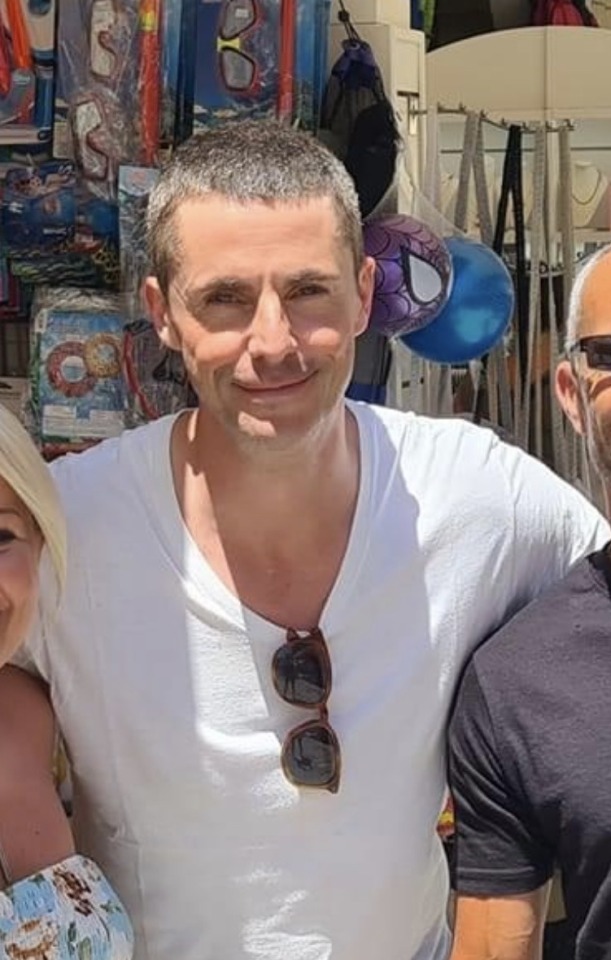
[📷 Kerry Hulme]
You can see he's got quite a lot of grey hairs back in 2010 in Leap Year and earlier.
He had is dyed for ADOW, Downton, The Offer etc. and it looked pretty dark for Silent Night as well, but when it is natural then you see the truth -
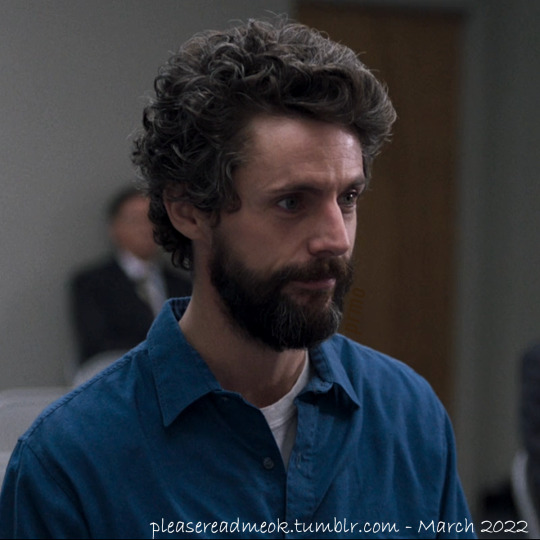
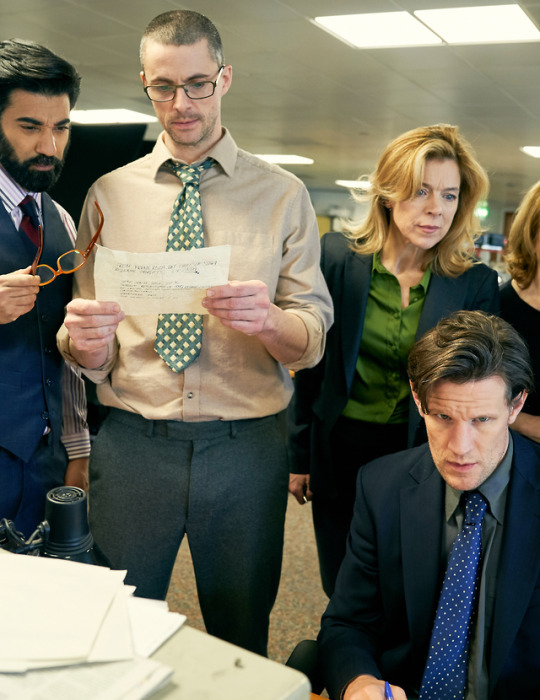
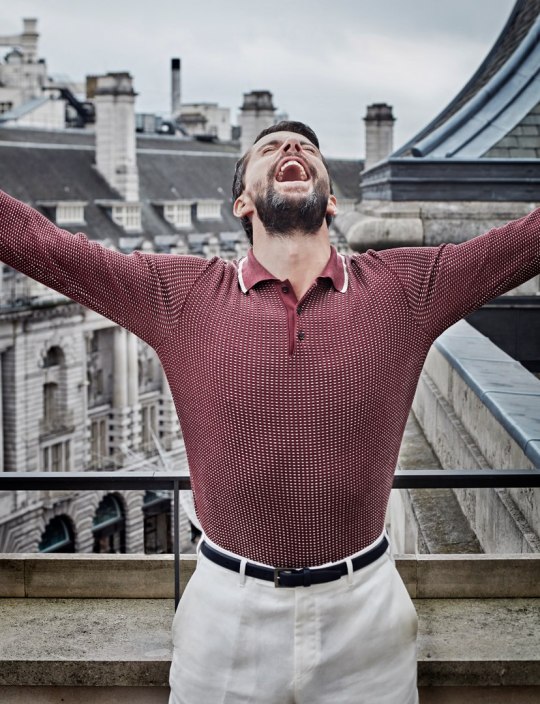
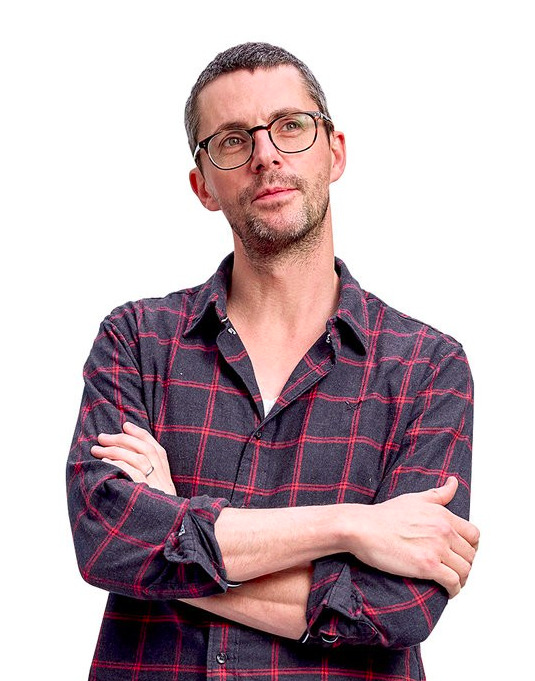
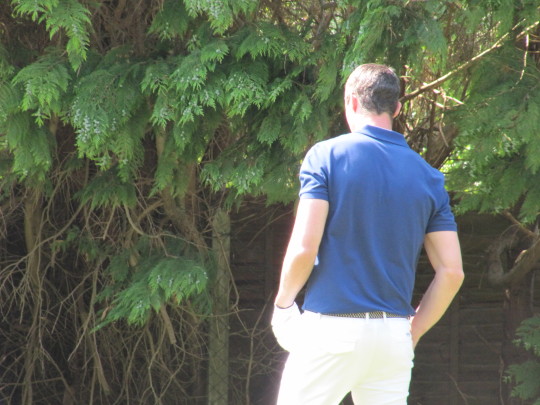
Sorry that last one is a bit rubbish - but just zoomed in on a shot from 2018 when he took his cap off.
Anyway - that's all I have observed from pics and in person.
Conclusion = SILVER FOX!!!
Hope that helps.
OMG yes - I looked up some photos of Ludwig and yes I see it. Interesting part for him. Personally I've wanted him to play this guy since I saw this portrait -

Samuel Jean Pozzi - 'Dr Love' - look him up. Brilliant bio by Julian Barnes as well. Amazing life. I mean look at that pic - that's Matthew right?
Thanks for the question @he-feels-deeply
📷 Birthmarked and Official Secrets screenshots/Uli Webber/Tom Jamieson/Me/ john singer sargent
12 notes
·
View notes
Text
Aaaaa thanks @void-and-virtue for tagging me!! Also I am so sorry I have just vanished off the face of the earth, but consider this a general update and “I’m alive” too. Also it gives me a chance to babble about so very many things!!! And I will do so at length!!!
Currently reading: an incomplete list of what I am reading and cycling my way through at the moment.
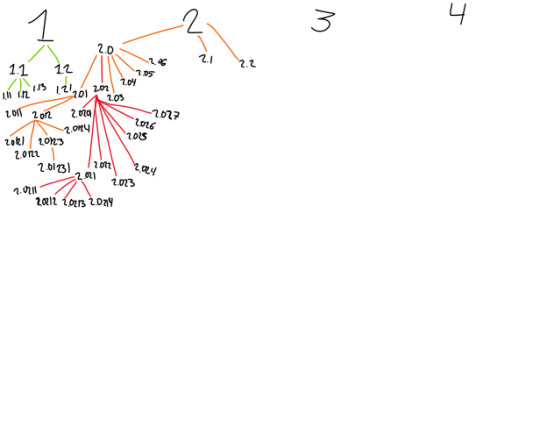
1. Rereading The Queen’s Thief series for some levity and joy in my life; I’m currently midway through Thick as Thieves again and am loving it as ever, 10/10 would recommend to anyone who hasn’t read it. Also my partner studies classics and so I get to go and harass them with this book series and ask about how it reflects elements of actual Hellenistic life (I know MWT wasn’t going by any means for a one-to-one but I really really enjoy getting to learn what a lot of the probable inspirations were, and also how the metaphysics of the Geniad reflect neoplatonic philosophy).
2. The Parable of the Sower by Octavia Butler. It’s absolutely brutal and I’ve been going through it slowly because it…is rough. It’s really good, but also wow it’s heavy. Feels very relevant to mention that like…my roommates and I have been having long discussions about the climate crisis, wildfires, and just the approaching Crumbles, and it’s lovely as ever to see a book that actually approaches the community-focused approach to the Crumbles. Not just doomsday libertarian preppers.
3. In Deeper Waters, actually on your recommendation Kylie! I started reading the book like a year ago and then dropped it, but found the audiobook again, and the audiobook is also narrated by uhhh. Kevin R. Free if I’m remembering right? Who also does the audiobooks for The Murderbot Diaries, which I love with all of my heart. Loving the book, have to be honest that I don’t necessarily love the voice that he does for Athlen, but I love him too much to not listen to this. (Also I just looked it up and apparently he’s the voice actor for Kevin in WTNV?????? Makes sense but AAAAAAA [kronk voice] oh yeah it’s all coming together.)
4. Tractatus Logico-Philosophiscus by Wittgenstein. Trying it again, finally. But I found the centenary edition by one publisher that lays it out in a tree format of sorts instead of just linearly? Which is apparently how Wittgenstein originally wrote it. This is to say—the edition I’d been reading previously addresses points in an order of like, 2.14; 2.141; 2.15; 2.151; 2.1511; 2.1512; 2.15121; 2.1513 etc. etc. etc. but the tree format addresses all points before addressing subpoints, so it’s 1; 2; 3; 4; […] 2.1; 2.2; 2.11; 2.12; 2.13; 2.14; 2.15; […] which is very very neat and way easier to understand in my humble opinion. (See attached diagram. As you can tell I gave up before even finishing the tree for proposition 2.02123.)
ANYWAYS that’s a lot of words and half an hour of trying to draw this out to say—it’s a piece of logical philosophy which is extremely foundational for 20th c. philosophy in pretty much every way, and it’s also extremely funny to me. A lot of people find it extremely dry but I think that it’s hilarious. And not in a way of like, I’m laughing at Wittgenstein, or that in a lot of ways I don’t think he was writing intending it to be humorous, but I don’t think he’s totally unaware of it. It just feels so cheeky at times. Because the whole thing is written in these expanding propositions which build off of one another, and so the propositions themselves are often very simple and straightforwards. Ex:
2.012 In logic nothing is accidental: if a thing can occur in a state of affairs, the possibility of the state of affairs must be written into the thing itself.
2.0121 It would seem to be a sort of accident, if it turned out that a situation would fit a thing that could already exist entirely on its own.
And that’s just hilarious to me! That part of proposition 2.0121 I’ve just annotated with “cheeky” because I find it very funny. I’ve tried reading this twice now (each time on a plane) and I finally sat down to review my notes from the first two sections, so now I can finally get into the meat of it for propositions 3-6.
What I love about the Tractatus is that a lot of people will cite the part of “What can be said at all can be said clearly and what we cannot talk about we must pass over in silence” but treat that like it’s the only and final conclusion of the Tractatus, because it’s really more like “Look! I did it! I solved all of philosophy, and it’s done nothing!”
Wittgenstein is absolutely on the list of Top 10 Saddest Men Of All Time and he’s a bastard and a motherfucker and I love him. He’s hilarious.
5. Mengele: Unmasking the “Angel of Death” by David G. Marwell. This one is also very heavy and extremely depressing.
6. Silver Under Nightfall by Rin Chupeco. I’m kinda on the fence about this one, I don’t want to DNF it but it’s a bit too heavy on the horny romance for me and not enough on the geopolitical vampire plot (personal preference). But I had been enjoying it for a bit, wouldn’t not recommend I guess
7. Gay Bar: Why We Went Out by Jeremy Atherton, which is about the history and disappearance of gay bars and physical spaces for queer community. This one hits hard personally, right now my city only has one designated “gay club” though there are a lot of other queer places in a less official way. There used to be so many and it breaks my heart, and reading this has been equally heartbreaking and wonderful.
8. Not a book but it’s making up the majority of my reading right now so I’m putting it on here because I need to babble about it that I’ve been catching up on a lot of school readings to try to turn in some late assignments from the last (checks watch) two years, so there’s been a lot of essays by Hannah Arendt, Walter Benjamin, a bit of Heidegger, and a lot of critiques of Heidegger—I’m currently rereading the part of Being and Time on Being-toward-death and Mitsein, and then following it up with sections of critique by Luce Irigaray from The Forgetting of Air in Martin Heidegger, and then the chapter “With Being-With?” from Being Singular Plural by Jean-Luc Nancy (and then after that, Simon Critchley wrote some notes on that, and I’m really looking forwards to reading that too); and also then “On The Coloniality of Being” by Nelson Maldonado-Torres, and then after that Aporias by Derrida, who I’ve also been reading a lot of for classes.
ANYWAYS.
Favourite Colour: You know when there’s a massive storm with really dark clouds, and it then passes, but the clouds are directly across from the sun, and so they’re being illuminated in front of you from the sun behind you, and then you have fresh green trees against the clouds? It’s the color in between the clouds and the trees, at the edges, because they look so golden. (Vital note: I do not wear my glasses as often as I should.)
Last Song: The Man With X-Ray Eyes by Bauhaus. Absolutely adore this album, it’s so so so goofy and I get this song stuck in my head all the time. Next time there’s a karaoke night I’m doing either this or Of Lilies and Remains because “Peter has fallen to the old cold stone floor wheezing and emitting a seemingly endless flow of ectoplasmic white goo from ears and mouth” is just so goofy and great to throw people off-guard. Please please please go listen to this whole album I love it.
Last Show: Baccano! Incredibly fun, 10/10, need to go and rewatch to get the plot straight in my head because of all of the time jumps. Also, outstanding jazz soundtrack. Love it so much. The best kind of bullshit.
Currently Watching: My partner got me watching The Owl House finally and I love it with all of my heart. Eda owns my soul. Hooty is great. Luz is my absolute beloved. I cried seeing on-screen queerness in this kid’s cartoon. Also Eda reminds me of my favourite professor. Identical energy, both absolutely deranged.
Last Movie: oh god. Uh. Literally the only thing coming to mind is Godspeed You! Black Emperor, which is a 1976 Japanese documentary about motorcycle clubs/gangs/movements in Japan in the ‘70s. A very uncomfortable watch, because it’s just…it’s very interesting, but watching bōsōzoku with fascist symbols plastered on their bikes, helmets, clothing, and skin, and their interactions with the cops and legal system, and the one kid’s interactions with his parents? It’s brutal. I know I’ve definitely watched other films since then but for some reason this is literally the only thing coming to mind.
Sweet/Spicy/Savory: Sour and/or salty. It can be sweet or spicy or savory but the important thing is that it’s either sour or salty.
Currently working on: One (1) extremely self-indulgent angst fic that I started ages ago, long-term WIP for when I’m feeling sad. A pile of papers for classes but one for fun on the digital location of (sub)culture and dark academia (in which the only real physical location for “dark academia” to exist is the academy, which is a fundamentally hostile environment that just sublates what “dark academia” considers itself to be); an essay on Benjamin’s Language as Such and the Language of Man and Arendt’s discussion of the inarticulate cry, both in relation to klezmer ornamentation as pure expression of language and/or grief; a piece that I might submit to a music zine about how Bowie’s song TVC-15 uses the stylings of surf rock in ways that create ambivalence about whether he’s singing about a bad trip and a TV (which he is), or a car that he loves deeply (maybe). Also the long-standing thing I’ve been writing about locutions of love, still an ongoing project. A history of my university, maybe? The line between projects for fun and projects for work have gotten a bit blurred.
Current obsession: beating the old Mortal Kombat arcade terminal at the punk bar down the way. It used to cost a quarter per game but now it’s a dollar so I’m very determined to get way way way better at it because otherwise it’s too expensive to play.
Tagging mutuals: Kylie I think you got most people I know but uhhhh. @uppercase-disgrace @edgy-contrarian dragging y’all into this??? anyone else who wants to!
5 notes
·
View notes
Note
Love your metas. You're extremely logically consistent, which is something I absolutely adore. No twisting. No bullshit. You're doing an amazing work. And I'm not saying this as a shipper. Just as a casual Naruto fan in general. I'm learning a lot about it, culturally, politically, in terms of literature. Please, don't mind stupid haters, debunk their with your flawless logic (if you even feel like it, otherwise don't waste your time). Anyway, just a Kant reader who also thoroughly think you're fucking satisfying to read.
Ah makes me really happy to see a fellow Kanthead. )) Kant, Wittgenstein and Kierkegaard are some thinkers I happen to admire a hell lot, not only when it comes to their analytical philosophy but also their epistemology and metaphysics. Well, Kiekegaard's metaphysics more than Kant's perhaps. His metaphysics was a tad too pious for my tastes. But still, he was the gamechanger of modern western philosophical thought. In fact, a whole lot of fans would benefit from the concept of converging their rational and empirical data to understand media in the way it was meant. Thanks for the vote of confidence, means a lot. ))
Just like Hume affected Kant, I can say I was awoken from my emotional slumber after watching Naruto. Hehehe.
13 notes
·
View notes
Note
Glad you’re back! Your insights are always appreciated, and thus, a question:
I’ve been putting off watching Ex Machina for the first time, despite (or probably because) the fact that I’ve already fallen in love with the character/Oscar’s portrayal of Nathan (in large part because of your wonderful writing!). I tend to do this when I have a new actor blorbo bc I let myself enjoy things like a repressed 1950s housewife, but I’m working on it. So I’m making it a goal to watch the movie, and that way I can start writing for Nathan with more concrete understanding.
What warnings/advice do you have for someone about to watch the movie for the first time? Spoilers are fine bc I’ve already read the synopsis AND I found out if you Google “Ex Machina script” that thing’s online??? For free???
Hope this makes sense, if all else just know it’s great you’re back!
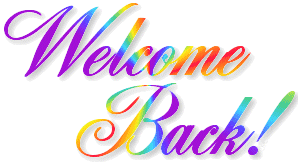
Hiiii! Thanks so much for the warm welcome back! That’s so kind,
So amazing that you’re going to watch the movie finally!! 😀 That’s some impressive restraint too. I could never.
I’m honoured that you trust my insights, but honestly I’d generally say just dive in and let it hit you. I’m excited for you to have your own unique experience with it, and I wouldn’t want to colour your experience too much with my own ramblings!
BUT, I am still going to share some things which sprang to the forefront of my mind when you asked the question. Mainly bc I love this film and I can’t resist the opportunity to talk about it and about Nathan, so thank you for the opportunity to do just that! 😆🧡 But I really would advise you to watch it first without reading them 😝
1) Nathannnnn 🥵 He pretty. He beautiful. I luff.
2) There are two neat divisions in the movie when it comes to the character of Nathan, imho. a) things we know for sure about Nathan and b) things we know for sure that Nathan needs Caleb to think about Nathan. One of the things I love about his character is the ambiguity, guesswork, and room for interpretation. Especially as the audience is placed in Caleb’s position and therefore our sympathies, assumptions, empathies, suspicions etc. more naturally fall on the side of Caleb’s interpretation. (Also bc there’s such lovely squashy room for interpretation, I’m sure that however you currently “see” him, the movie has enough wiggle room that you should safely be able to hang on to that version - if you still want to afterward, that is!)
3) Some / many of the Nathan + bot scenes are… uncomfortable. They’re… supposed to be?! Especially as we’re seeing them from Caleb’s POV, and with some major assumption of sentience on behalf of the bots.
4) Why do all his clothes seem too long for him?! I know he can afford a tailor 😂
5) I know the design of Nathan’s compound isn’t for everyone. Personally, it’s just my cup of tea. I’d move in tomorrow and wouldn’t change anything, besides maybe replacing all of his paintings 😂 I also think the movie is a great example of the set design / setting really adding a lot to our interpretation of the character, the tone and feel of the movie. Here’s an article I enjoyed on the subject:
6) It’s wild to me that this movie is presented as “with Oscar Isaac”, as though he’s minor to the piece. To me it is his movie, he’s the central character, and I don’t understand how he can be suggested as having a side role.
Please let me know what you think once you’ve seen it?! I’d love to hear your takeaways and whether your interpretation of him changes at all after watching. I really hope you enjoy it but ofc however you feel about it and about our collective grumpy husband is 100% valid! I enjoy hearing all the different takes on it all so much.
Have fun! 🧡🥳🧡🥳🧡
2 notes
·
View notes
Text
about twitter (or how I learned to get back to worrying and stop loving the bomb)

Maybe a global 'public square' doesn't lead to worldwide empathy, but to a planet-sized arena of miscommunication where a 15 y/o english student with ADHD fights a 53 y/o cuban programmer over the ethics of self-diagnosis with both sides throwing personal anectodes at the other.
I don't wanna think that's the case, I wanna believe in the promise of the internet, but I'm not sure I can point to the algorithm filter bubbles or even the low character limit and state that that's the cause of all our problems.
It makes things *worse* though, don't get me wrong.
Wait, no, my whole point is that you *will* probably get me wrong, cause we probably don't share the same (or are even cognizant of each other's) cultural background, experience, neurodivergences or even mother tongue, twitter is a final fantasy boss designed by Wittgenstein.
All these barriers *can* be crossed if we come from a place of curiosity rather than judgement and take the time to learn about each other, but we're not gonna (and can't) do that to 500 strangers every day, and that sucks, I love the lack of structure in twitter .. in theory.
But maybe tumblr (and even reddit) work a bit better *because* they're more atomized (tumblr isn't as organized, but you're still far less exposed to random stuff from completely outside your circles), the dream of the mega-agora is appealing, and maybe someone somewhere will make a version of it that really will nail it, that will lead to people understanding and valuing their differences, but the versions of it we've had so far just remove all context from everyone we meet, which lead to more and more generalizations, cause that's how we came to think about each other.
My primarily experience with "popular tweets" was seeing broad sweeping statements about "men" or "women", or "incel cryptobros" or "leftist sjws", even sillier labels like "swfties" or "k-pop stans", the average interaction there is trying to figure out which boxes someone fits to speedrun human interaction, and that's... how an algorithm thinks.
I don't even think it's wrong, I did my best to communicate I fit the boxes "anarchist", "adhd", "non-binary", "artist", "retro sci-fi anime fan", I block alt-right weirdos on sight and make fun of checkmarks, I have practically pre-written replies to some kinds of people, but every now and then I feel the slight existential dread of realizing I could program a bot to do *the exact same thing*.
That's not what I wanna use my brain for, I've read big threads of different people fighting in different years play out virtually the exact same way, we're responding to decontextualization by adopting the same generalized signals, and I don't wanna become a bot, man.
What I mean is that neural networks trained to "sound human" are fed countless tweets by random people from all walks of life to try to mimic this amorphous idea of a vague human who doesn't have any of the individual qualities of a person.
And that's what I was doing, too.
I had a tumblr before, ages ago. I was still checking boxes then, mainly about fandoms, and every version of living online will involve some of that. But I believe that there's a healthy version to be achieved, communicating shorthands for who you are and what you like so you can find potentially likeminded people. Maybe I can achieve that here, again.
I think I did once, when I was too young to even realize it, and then I left it all and swam towards the social media event horizon.
See, the thing about working from home, online, is that I never really stopped spending the majority of my time in a computer, more than most of my IRL friends, most of whom have real world jobs and are sure as hell a lot closer to a balance than I am.
I kept thinking of the internet like entertainment, not too different from TV or video-games, so I kept looking to what drew my attention more effectively, just go where the current takes me, why would I put rules on fun? But it hasn't been fun. It hasn't been fun for a while, now. Because I didn't give myself rules, and the "current" metaphor doesn't work when there's an actual poseidon made of code controlling the direction of the currents.
Sometimes, you have to consciously chase the fun.
So, you know, hi.
3 notes
·
View notes
Text
2022/09/27 English
I went to the library and borrowed Haruki Murakami's "Underground". I can remember that I read this book a lot when I was a college student. Learning the incidents Aum had done, I think that I could join in the cult as Aum and spread sarin gas for salvage because I could have believed that must be good. Then the incident Aum had done had a certain relationship with my life. Referring to the incident from the goodness, even now there are some people who do 'strange' things from their goodness. I can lose the ethic in myself and lose myself. I must be careful about it.
Today was the day we had the state funeral of Shinzo Abe, the ex-prime minister. I was afraid of reading tweets on Twitter (so tried to ignore them). This might come from the fact I often read some tweets with a strong bias, but I couldn't ignore that there were some 'bloody' or 'aggressive' tweets. Indeed, I stand in the position of 'anti abe', but it is clear that he must not wish for such a miserable death. So I want to pray for him, but we can ask if we should pray for him at the 'state funeral'. We might have to do more important things than the funeral (we must remember Shizuoka's disaster). So my thought gets frozen there.
Reading "Underground" and "Underground 2", and also other Haruki Murakami books. Reading Haruki might be a lesson for me for a person like me who can't adapt oneself (it can be called 'anti-society') enables to live in this society, or become a member of this world. How can I throw huge self-love or ideal away and accept this myself? How can I accept this person who must not have any special talents? How can I live this life as an ordinary person... (as Wittgenstein says, just 'being here naturally' must be a miracle).
This evening, I watched the third episode of "Extraordinary Attorney Woo". It was a serious episode that approached about autism seriously and made me think about it again because I also have autism. I can't explain this from any academic point of view, but autism is the handicap of 'the characters which everyone has basically appear as serious problems because they are too much'. In other words, if this society accepts that handicap from another point of view, that handicap shows another face. Can I say that "if this society accepts it so softly, then autistic people can live a little bit easier"? Indeed, I have to do the action, not just say beautiful dreams...
3 notes
·
View notes
Note
The Most Unwanted Song Lyrics
[Intro: Dina Emerson]
Uh-oh, uh-oh
Uh-oh, uh-oh
Uh-oh, uh-oh
[Verse 1: Dina Emerson]
Yo, I'm ropin' up my saddle for the long, long ride
Every time I see the desert there's something inside says
Yo, yo, this is the life, give me open land and a big ol' knife
To get some bear, deer, even a snake!
I light me a fire, do the shake and bake
I say, "Yo, yo" I'm a cowboy now
The sun is hot and dry, gonna rope me a cow
I say, "Yo, yo" I'm loose and free
Whoa there Nelly, you're the horse for me!
[Chorus: Dina Emerson]
Rope 'em up boys
The desert is a callin'
Yahoo, yahoo, yahoo
(Saddle up fellas)
The desert is a callin'
Yahoo, yahoo, yahoo
[Refrain: Children's Choir]
Hey everybody, it's Christmas time!
Christmas time! Christmas time!
Jesus, Mary, and the manger
Christmas time, Family time
Do all your shopping
At Wal-Mart!
Easter Time! Easter Time!
Love, forgiveness, and the bunnies!
Easter Time! Chocolate Time!
Do all your shopping
At Wal-Mart!
[Interlude: Children's Choir]
Go, go, go, go, go, go, go, go, go, go, go, go, go, go, go!
[Verse 2: Dina Emerson]
Out on the plains, just me and my mind
Took me a break to read some Wittgenstein
Born in Vienna in '89
He obsessed with theories of language and time
Like the Tractatus where Ludwig would claim
"The logic of our language is misunderstood"
Philosophy is based on a false pretence
So philosophy itself is nonsense, nonsense!
Philosophy itself is non-sense!
[Chorus: Dina Emerson]
Bedeutung ist tun
Es ist ein Sprachspiel
Nonsense! Nonsense!
Wörter sind Inhalt
Jawohl! Jawohl!
[Refrain: Children's Choir]
Yom Kippur! Yom Kippur!
Self reflection and atonement
Yom Kippur, that's what for
Do all your shopping
At Wal-Mart!
[Bridge: Children's Choir & Dina Emerson]
(Oh, say, "Can you—") Feel the embers glowing
And the turkey in the oven!
(America!) Hear the children singing
There's a turkey in the oven!
(Rockets red glare!) Candles are so pretty
And a turkey in the oven!
Do all your shopping at Wal-Mart!
(Buy spurs that jingle at Wal-Mart!)
[Refrain: Children's Choir]
Ramadan! Ramadan!
Lots of praying with no breakfast!
Ramadan, so much fun!
Do all your shopping
At Wal-Mart!
[Verse 3: Dina Emerson]
It's home, home on the big ol' range
Yippee tai oh, get along there stranger
Rope 'em, ride 'em, shoot 'em up good!
We're big and bad in the cowboy 'hood
I say, "Yo, yo" got a river to ford
With a life like this I never be bored
I say, "Yo, yo" I'm wild and free
Whoa Miss Kitty you're the gal for me!
[Chorus: Dina Emerson]
Woah, Miss Kitty
I say, "Woah" there
Woah, Miss Kitty
Yahoo! Yahoo!
[Refrain: Children's Choir]
Labor Day! Labor Day!
Schools are closed and
Pools are open!
Labor Day! All the way!
Do all your shopping
At Wal-Mart!
[Bridge: Children's Choir & Dina Emerson]
(Oh, say, "Can you—") Grandma's on the phone
Go and tell her that you love her!
(America!) Daddy's on the phone
Go and tell him that you love him!
(The Golden Land!) Sister's on the phone
Go and tell her that you love her!
Do all your shopping at Wal-Mart!
[Refrain: Children's Choir]
Veteran's Day! Veteran's Day!
Big parade with guns and soldiers
Veteran's Day! What's there to say?
Do all your shopping
At Wal-Mart!
Halloween! Halloween!
Candy corn for lunch and dinner!
Halloween, what a scream!
Do all your shopping
At Wal-Mart!
[Verse 4: Dina Emerson]
Look out there, it's an Injun band!
Coming this way, gonna fight for my land
And build a home town grocery store
American cheese, worth fighting for
Call it "dry gulch" O.K. Corral
Holiday spot dor you and your gal
To get some cool shit and desert rays
Cowboy livin' the American Way!
[Interlude: Dina Emerson & Children's Choir]
It's a cowboy living
(Go! Go!)
It's cowboy living
(Go! Go!)
It's cowboy living
(All the way!)
[Chorus: Dina Emerson]
Rope 'em up boys!
The desert is a callin'!
Yahoo! Yahoo! Yahoo!
Saddle up fellas!
The desert is a callin'!
Yahoo! Yahoo! Yahoo!
[Interlude: Nina Mankin]
People!
Coming together out of a desire to obtain political power!
Vice Presidential Candidate!
Twenty-seven electoral votes!
Central policy issues!
Two party system!
Struggle!
Gain control of the government!
Executive branch!
Military branch!
Foreign affairs!
Influence policy!
Promote ideology; fascism!
Promote individual interests;
George Stephanopoulous, Imelda Marcos!
Promote special interests;
Sugar, Beef, Bananas, Lumber, Pork bellies, Pork barrels, Coca-Cola!
The information superhighway!
Three thousand years of oppression!
Who enslaved people of color?
Who invaded the Caribbean?
Who murdered all the innocent children?!
You did! You! You! You!
[Outro: Group]
It may be you
It could be me
It's not enough
To wait and see
And when we all
Lock arms and sing
Then bells of freedom
Ring ding ding!
(It may be you!)
It may be you
(It could be me!)
It could be me
(It's not enough!)
It's not enough
(To wait and see!)
To wait and see
(And when we all!)
And when we all
(Lock arms and sing!)
Lock arms and sing
(Then bells of freedom!)
Then bells of freedom
(Ring ding ding!)
Ring ding ding!
(This was meant to be sent off anon. I keep seeing the anons having fun and thought I’d join in. Here’s the context: This song was written incorporating the results of a survey that asked about people’s least desirable elements in music. The resultant list included politics, cowboy music, bagpipes, opera, rap, children’s voices, tubas, and advertising jingles, so they incorporated those and other undesired elements into this 22 minute opus. (I have never actually read or watched this all the way through, so I don’t know what it says.)
Wow, this is simply brilliantly awful. I hate and love it, Thank you
4 notes
·
View notes
Text
“Simplicity is the ultimate sophistication.”Leonardo da Vinci
“The aspects of things that are most important for us are hidden because of their simplicity and familiarity.”
Ludwig Wittgenstein
I love simplifying my life. It makes me more effective and life less stressful. It makes me calmer and happier. And it simply makes life easier.
But where do you start? Or continue if you are already on your way?
In this week’s article I’d like to share 23 small habits that help me to live a simpler life.
Pick one of these to get started and keep doing it until it sticks and becomes just another normal part of your life.
1. Breathe.
When stressed, lost in a problem (or a mistake) or the past or future in your mind breathe with your belly for two minutes and just focus on the air going in and out.
These deep breaths will calm your body down and bring your mind back into the present moment again.
2. Do one thing at a time.
You’ll get better results and feel better and less stressed while doing those things.
3. Write it all down.
Use your mind for better things than remembering what to do. And the mind is often like a leaky bucket.
So write down all your great ideas, insights and thoughts before they go missing somewhere and add what you need to do to a to-do list.
4. Do all your food shopping once a week.
You’ll save time, energy and – in my experience – money.
5. Stop trying to do things perfectly.
It will only get you stuck and drain your self-esteem.
Go for good enough instead and when you are there you are done. Get things all the way to done this way and then move on to the next thing.
6. Stop doing what you don’t like doing anymore.
Life changes and so do you.
If you don’t like doing something anymore then stop doing that (even if it may take some time before you can do so by for example switching jobs).
7. Pack your bag before you go to bed.
Then you don’t have to get stressed out by that in morning and you are less likely to forget something.
8. Throw out the things you haven’t used in 1 year.
Go through what you have and ask yourself if you have used it in the past year. If not, give it away to charity or a friend or simply throw it out. Less stuff tends to make life simpler.
9. Ask yourself simplifying questions every day.
Questions like:
What is the most important thing I can do right now?
What is one small step I can take to simplify this situation?
10. Keep everything in its place.
If everything has its own place then it is whole lot easier to keep your home reasonably ordered and decluttered from day to day.
This also helps you with your inner stillness as the outer environment affects how you feel on the inside.
11. Cook more food than you’ll eat.
We usually make four or more servings of what we’re about to eat. This cuts down on time that you spend on cooking and you’ll have to do less washing up in general.
Plus, it’s good to have portions of food to bring to work to save some money.
12. Write shorter emails.
I tend to write emails containing only a few sentences, usually between one and five. If you focus on keeping it short and focused then you’ll probably discover that this is a good solution in most cases.
13. Ask instead of guessing.
Reading minds is hard. So, instead ask questions and communicate.
This will help you to minimize unnecessary conflicts, misunderstandings, negativity and waste of time and energy.
14. Use a minimalistic workspace.
My workspace contains a big monitor and a small computer on an adjustable standing desk. I use a comfy chair and there is room for my glass of water beside the computer.
That’s it. There are no distractions here. Just me, the computer and the water.
15. Check everything just once a day.
I check my email inboxes, blog statistics, my online earnings, Twitter and Facebook just once a day.
I combine all that checking into one small daily ritual at the end of my workday so I don’t slip and go checking it more during the day and waste my energy and attention.
16. Choose small daily acts of kindness.
Instead of small acts of judgment and criticism towards the people around you (and towards yourself).
17. Stop trying to please everyone.
There will always be people who you don’t get along with or that do not like you for some reason.
18. Don’t make mountains out of molehills.
Before you start thinking too much about something and building it up something big in your head, ask yourself:
Am I making a mountain out of a molehill here?
And if you get lost in victim thinking then ask yourself:
Does anyone on the planet have it worse than me right now?
19. Spend 10-15 minutes each Sunday or Monday morning to plan out the week.
Write down your plans for the week, organize your prioritized to-do list and get ready for the week before you are in the middle of it all.
This will help you to find more clarity, get more of the most important things done next week and minimize stress.
20. Cancel unnecessary subscriptions.
I’m sure that you, just like me, have subscriptions to newsletters, various accounts on social media and streaming services that you rarely get around to watching or reading anyway.
Cancel them to declutter your inbox and social media flows. Plus, perhaps save some money.
21. Spend more time with the people that help you to keep things simple.
And spend less time with – or move forward and away from – the people that drag you down into overcomplicating everything and creating unnecessary drama. Healthy relationships or unhealthy ones will have a big effect on your so choose carefully.
22. Say no more often.
If your life feels overwhelming then you may have to start saying no more often.
To other people. And to yourself too.
To carve out more time and space for you to recharge and for family life, your health and the hobbies that mean the most to you and your well being.
23. Put a limit on those digital distractions.
Put your phone in another room when hanging out with family or friends, when working or when watching the TV.
Keeping the phone out of reach is the simplest and most effective habit I’ve found to reduce my screen time, my stress levels and negative thoughts and to free up more time in my week.
0 notes